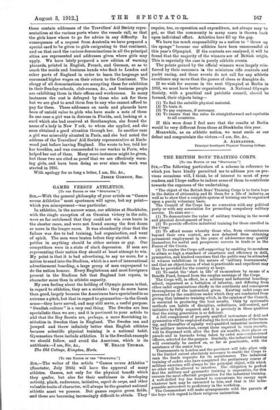GAMES VERSUS ATHLETICS.
[To THE EDITOR OF THE " SPECT•TON..".1 SIR,—With the general philosophy of your article on "Games versus Athletics" most sportsmen will agree, but my point— which you misrepresent—was particular.
In athletics, in the narrow sense, our athletes at Stockholm, with the single exception of an Oxonian victory in the mile, were so far outclassed that they could not win even heats in the shorter races, and were not found among the first dozen or more in the longer races. It was abundantly clear that the failure was due to bad training, bad organization, and want of spirit. The men were beaten before they started. A com- petitor in anything should be either serious or gay. Our competitors were in a state of slack depression. If men are representing their nation they should at least attempt to win. My point is that it is bad advertising, to say no more, for a nation to send into the Stadium, which is a sort of international advertisement hoarding, a large group of men unprepared to do the nation honour. Every Englishman and most foreigners present in the Stadium felt that England lost repute, in character more than in athletic capacity.
My own feeling about the holding of Olympic games is that, in regard to athletics, they are a mistake : they do more harm than good, largely because the Americans have specialized to so extreme a pitch, but that in regard to gymnastics—in the Greek sense—they have served, and may still serve, a useful purpose. " Swedish culture" is a very real thing. The Swedes are less specialistic than we are ; and it is pertinent to your article to add that the Boy Scouts are, perhaps, a more flourishing in- stitution in Sweden than in England. The Swedes ran and jumped and threw infinitely better than English athletes because scientific physical training is a national habit. Gymnastics there include athletics. It is the Swedish example we should follow, and avoid the American, which is its antithesis.—I am, Sir, &c., W. BEACH THOMAS. The Old Cottage, Eimpton, Herts.




































 Previous page
Previous page